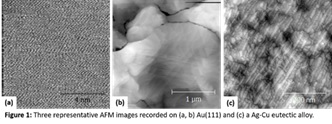
Arnaud Caron
KoreaTech, Republic of Korea
Title: Thermodynamic effects on metals tribology at the nanometer scale
Biography
Biography: Arnaud Caron
Abstract
Understanding and controlling the surface mechanical behavior of materials is crucial for the development of new devices. We have investigated the effects of chemistry on the friction and wear behavior of face centered cubic metal and alloy surfaces in contact with a single asperity by friction force microscopy. In the low load regime below 10 nN, we show that sliding friction behaviors of different metallic couples is governed by their thermodynamic affinity. Comparing the friction behavior of miscible and immiscible couples we find that in the first case friction is governed by adhesion while the friction force is almost independent on the normal load. In the latter case of immiscible couples, adhesion is found to be low and the friction force increases with the normal load. At larger loads, friction and wear of pure fcc metals is found to scale with the ratio of the surface energy to the hardness, which describes both contributions involved into the ploughing process: the resistance of the material to flow ahead of a penetrating asperity and the formation of a fresh surface behind the asperity. Finally, we show how the tribological response of a Ag-Cu nano-eutectic alloy surface is affected to its solidification velocity. It is found that both the microstructural length-scale and the solubility of both elements into one another determine the wear response of this alloy.

Recent Publications
1. Ko HE, Kwan SG, Park HW, Caron A (2017) Chemical effects on the sliding friction of Ag and Au(111). Friction; doi.org/10.1007/s40544-017-0167-5.
2. Kang SJ, Rittgen KT, Kwan SG, Park HW, Bennewitz R, Caron A (2017) Importance of surface oxide for the tribology of a Zr-based metallic glass. Friction 5: 115-122; doi.org/10.1007/s40544-017-0149-7.
3. Caron A (2016) Quantitative hardness measurement by instrumented AFM-indentation. Journal of Visualized Experiments 117; doi: 10.3791/54706.
4. Caron A, Bennewitz R (2015) Lower Nanometer-scale size limit for the deformation of a metallic glass by shear transformations revealed by quantitative AFM indentation. Beilstein journal of nanotechnology 6:1721-1732; doi: 10.3762/bjnano.6.176.
5. Caron A, Louzguine-Luzgin DV, Bennewitz R (2013) Structure vs chemistry: friction and wear of Pt-based metallic surfaces. ACS Applied materials and interfaces 13:11341-11347; doi:10.1021/am403564a.

